Two days before The Connecting Grounds’ special occupancy permit was to expire at the end of April, Pastor Christie Love got some good news. Springfield city officials approved Love’s request to turn the church building into a year-round transitional shelter.
The Connecting Grounds is a church that focuses on helping the unsheltered community, as well as persons in poverty and families with kids in foster care.
Like a handful of other churches in Springfield, Connecting Grounds had been using its church building as a crisis cold weather shelter this past winter, opening on nights when the temperature dipped below 32 degrees.
When the official “cold weather shelter season” was over at the end of March, The Connecting Grounds shifted from an emergency shelter model to a transitional shelter program with case management services and requirements for residents aimed at helping them achieve stability and independence.
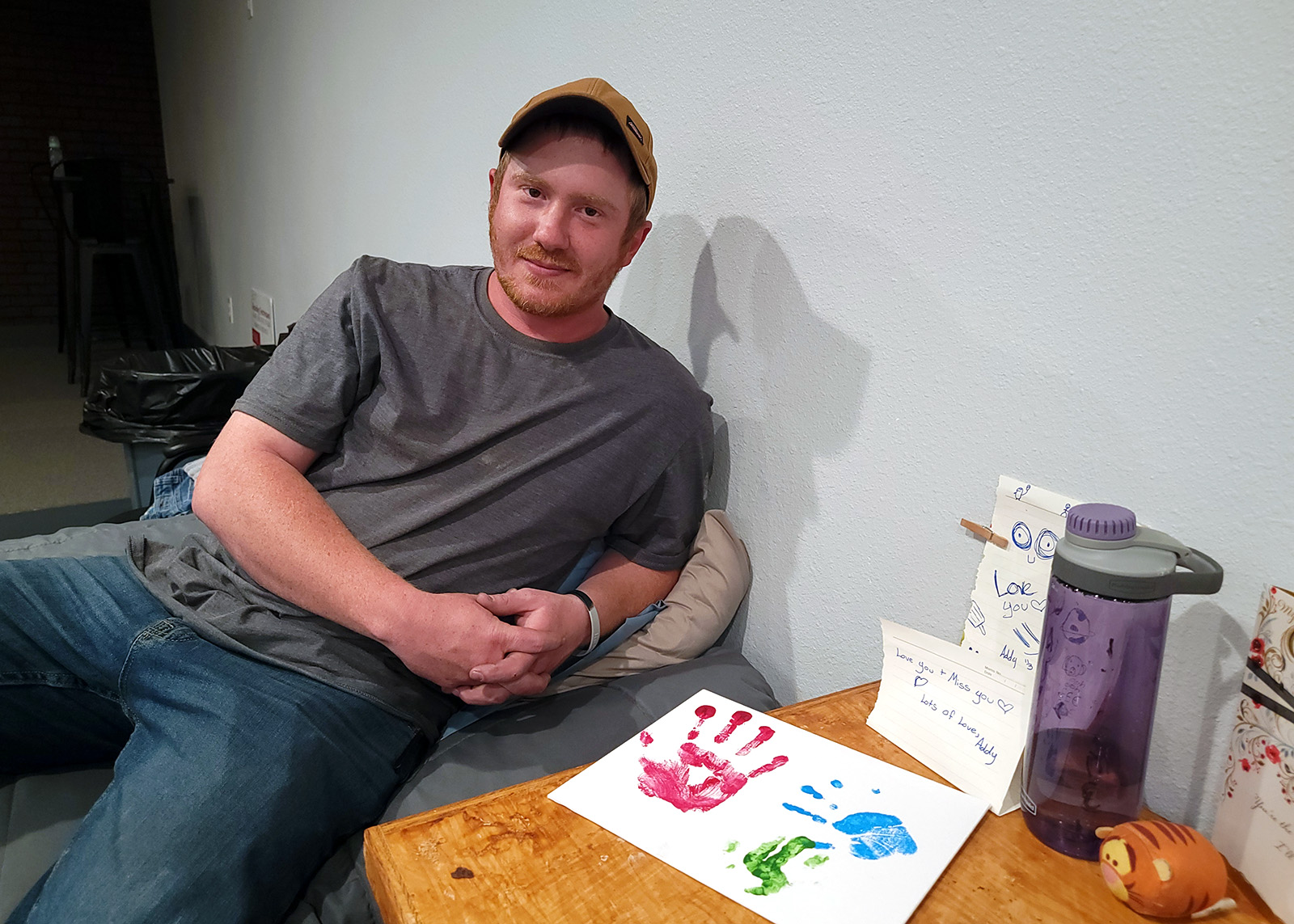
Currently, there’s room for eight people to stay in the small church building. Love plans to remove the stage to allow bedspace for two more people. But the city didn’t just approve allowing the church building to become a shelter. The Connecting Grounds got the green light to convert the garage building into a small studio apartment, where the shelter program director and her husband will live on site to oversee operations.
The small house next to the church building is currently home to the Family Connections Center, a program that offers biological parents and their children in foster care a safe and homey place for their weekly supervised visits. The city also approved Love’s request to turn that house into a three-bedroom non-congregate transitional, supportive housing model.
All told, The Connecting Grounds will be able to provide shelter for up to 15 individuals at its church property at 4341 W. Chestnut Expressway.
The goal is to raise $300,000 — with $250,000 to purchase a four- or five-bedroom home inside Springfield and make any necessary renovations and $50,000 to support the transitional shelter volunteer program.

The Family Connections program will continue in its current location until the new home is purchased and renovations are completed.
The Connecting Grounds launched the Increase Our Impact 2023 fundraising campaign, which seeks to raise the funds by the first of June.
So, what about church services?
Love, along with the Rev. Phil Snider from Brentwood Christian Church, announced in March The Connecting Grounds congregation would begin having in-person services on Saturday nights in the fellowship hall at Brentwood Christian Church in southeast Springfield. The Connecting Grounds congregation had been having services virtually so the church building could be used as a shelter over the winter.
This “building sharing” arrangement with Brentwood will continue.
“With all of the empty buildings, church buildings around Springfield on a regular basis,” Snider said in March, “there’s so much possibility for collaboration.
“It’s the kind of work Jesus was about,” Snider said, referring to Connecting Grounds’ focus on helping the unsheltered. “It’s the kind of work of just hands-on responses to the gospel, of not just talking about the gospel in terms of ideas to consider and to accept into your heart — but a real life way of living out the gospel in the spirit of Jesus. And I’m inspired by that, and here at Brentwood, we’re just honored to be a part of it.”
About the transitional shelter program
With The Connecting Grounds transitional shelter program, residents are provided case management services and must volunteer 15 hours every week at the Outreach Center to stay in the program.
The program requires sobriety. Random urine and breath tests are given regularly.
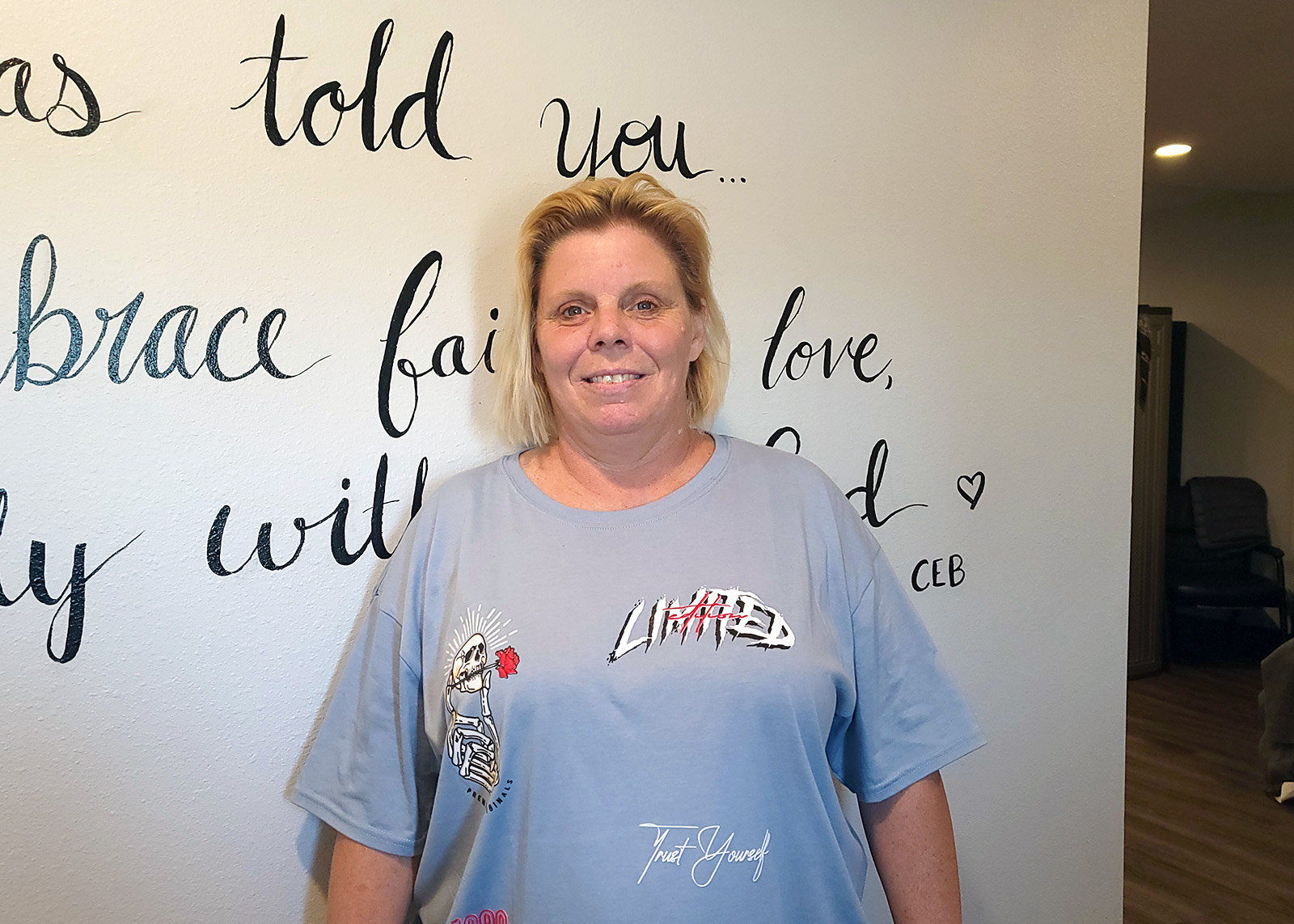
With support from a case manager, residents set goals for themselves and complete weekly tasks to work towards those goals and eventually into stability and permanent housing.
There’s no set deadline on how long a person has before they have to exit the program, explained program director Delana Gilliam, who was once unsheltered herself.
“It might take one person a few months,” Gilliam said. “Others, it might take six months to a year. We go by case-to-case basis. We want to work with them to succeed.”
Christopher Hendon is among the current residents. He said the church’s slogan of “Love Out Loud” is something that speaks to his heart.
“That gets me the most,” he said. “They loved me till I could love myself. It means a lot to me.”
In addition to volunteering at the Outreach Center, Hendon and three other shelter residents are working part-time for the No Reservations Food Truck, a nonprofit organization that aims to provide unsheltered and formerly unsheltered people with job training and experience in the food industry.
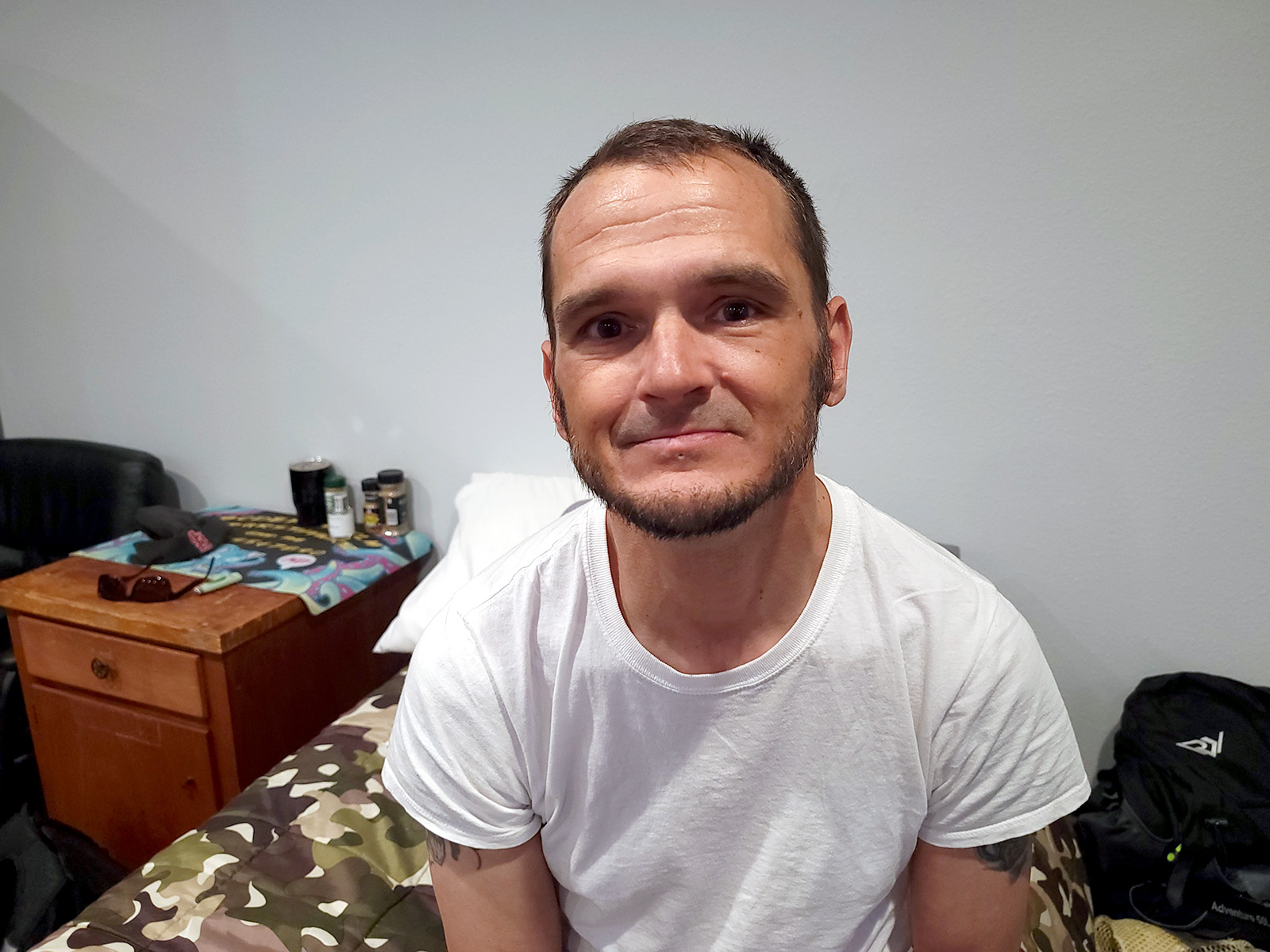
“We are working part-time jobs. We just got our food safety certificates,” Hendon said, smiling. “Volunteering and keeping busy and going to church. I haven’t been to church in 15 or 20 years, and I actually love going to church.”
Tommy Potter is a resident at the shelter. Like Hendon, he works part-time with the No Reservations Food Truck and recently earned his food safety certificate through the Springfield-Greene County Health Department.
Potter said he first heard about The Connecting Grounds last summer, when he and his fiancée were sleeping in a park, along with their dog Brownie, a schnauzer/shepherd mix that is their “baby.” They’d go to the Outreach Center for food.
Potter said they were both battling substance use disorder. A few months ago, he and his fiancée got fed up with the drugs and stopped using on their own, which is really difficult to do while still on the streets.
“I was at the bottom of the barrel with court appointments, trying to figure out how to get to my doctor, trying to stay sober,” he said. “I was tired of the drugs. I was tired of being on the street, so I quit on my own.”
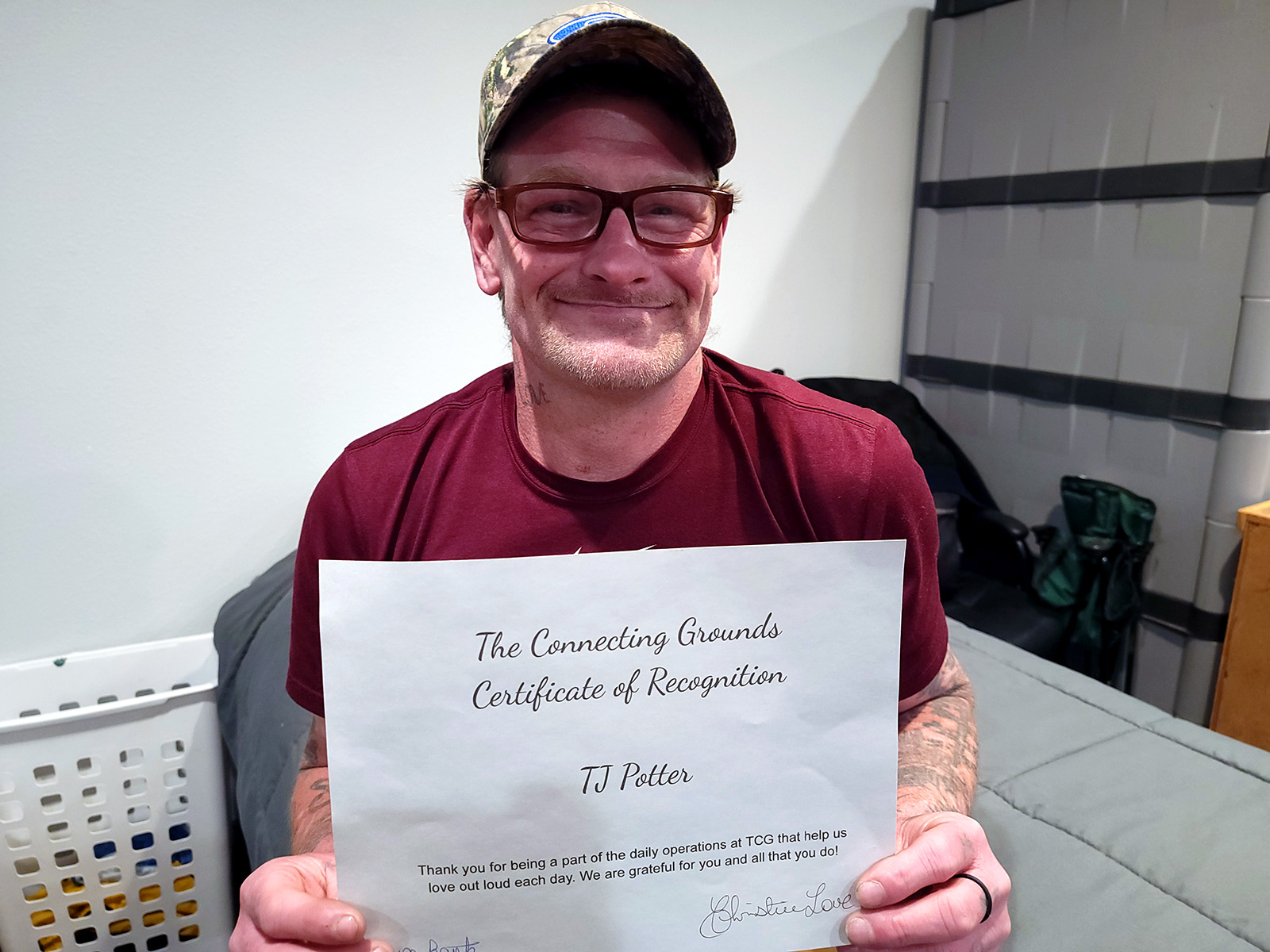
Potter said he encouraged his fiancée to get into a low-income housing complex with Brownie. Because he is a felon and still on probation, Potter knew putting his name on the lease would prevent his fiancée from getting housing.
Then Love told Potter about the relatively new transitional shelter program.
“She is like, ‘First question: can you pass a UA (urine drug test)?’ I said yes ma’am. She’s like, ‘Here’s the deal,’” Potter said. “I was like, ‘I’ll take it.’
“This is really a great program,” he said. “It’s a great place to be. I’m not on the streets. I’ve got a great support group with everybody. I get along with everybody. I don’t have to worry about anyone stealing from me. And it’s made it a lot easier to walk up the road and be able to deal with temptations.”
Family Connections for foster kids, biological families
Families who are referred by the Children’s Division to the Family Connections program are those with the goal of reunification — not biological parents who have pending criminal charges involving a child or other serious reasons why reunification is not on the table.
At the current location, the center has room for two families to have supervised visits at one time. According to the program’s creator and director Holly Madden, there are 25 families on the waiting list right now.
“And I can’t tell you how often I get calls from case workers asking if we have an opening and they don’t even bother (getting on the waiting list),” Madden said. “I get calls from case workers asking us to take a family because the support we provide with this program is unlike anything out there. Not only do we supervise (visits) but we come alongside those families. We support them.”
When they are able to move the program into a bigger house, Madden said they’ll be able to possibly triple the amount of visits they do at a single time. They will also have a pass code to unlock the door that they could give to case workers who need a place to supervise visits.
“It will allow us to expand not only evening hours, but we could potentially have afternoon hours, daytime hours and weekend hours,” she said.
Prior to the creation of the Family Connections program, Greene County bio-parents and their children in foster care were limited to having their visits in public places like libraries and parks. Many families have to use a meeting room inside the Missouri Children’s Division office in downtown Springfield.
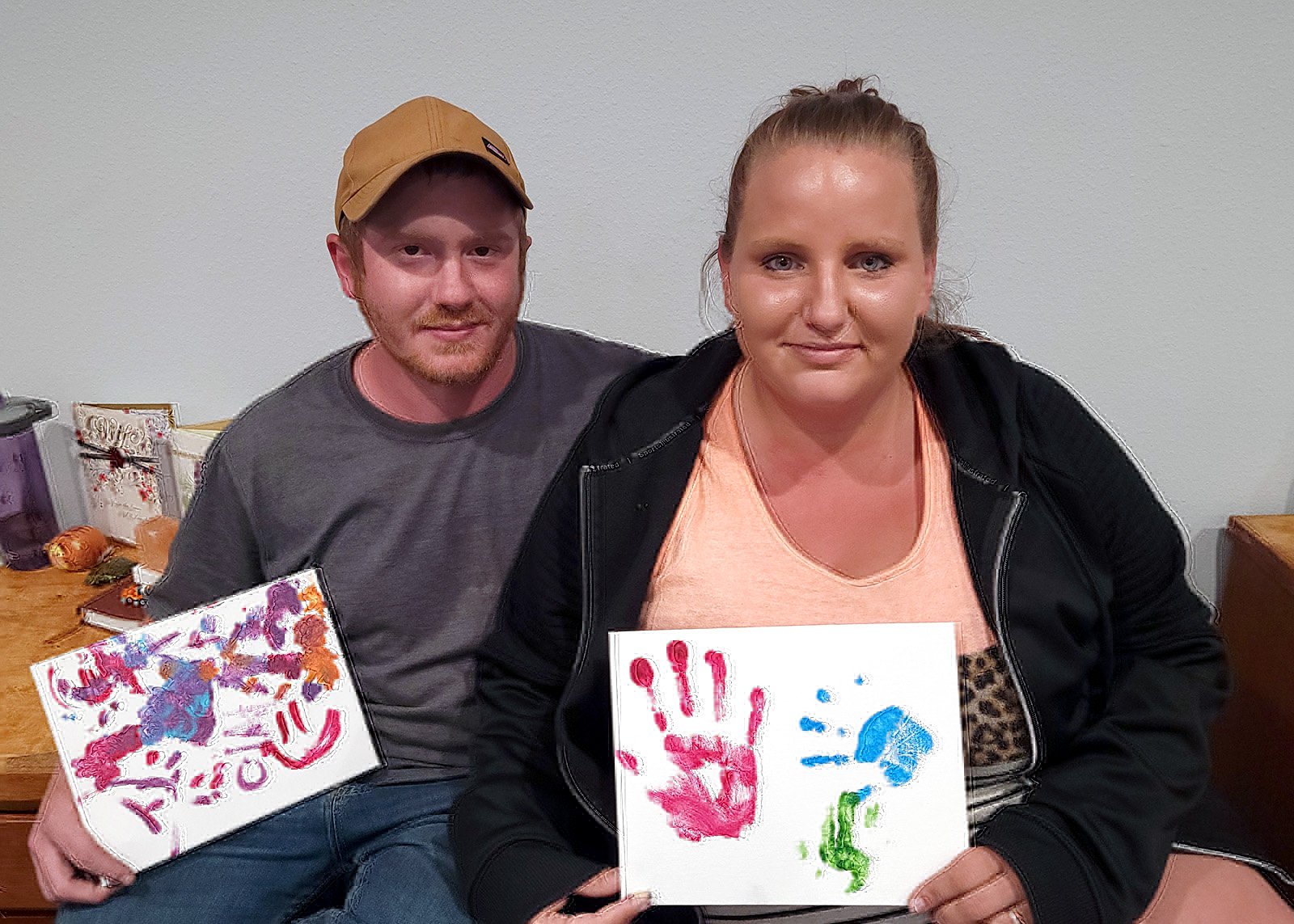
Jeromey Dennis and Lauren Helton said that the bland meeting room at Children’s Division was where they had supervised visits with their children. Now they have their supervised visits at the Family Connections Center.
“It’s a lot better than sitting in the office,” Dennis said. “Over here, they’ve got toys. They’ve got art supplies. They can make and paint while we visit.”
Dennis and Helton say their children were removed from their custody due to the couple’s struggles with substance use disorder and housing instability. They are clean and in treatment now and staying at The Connecting Grounds’ transitional shelter.
They were both thrilled to learn that city officials had approved the request to make it a year-round shelter program.
“It’s completely life changing. We went from homeless and addicted to sheltered and happy,” Helton said. “I’m actually proud of myself. I haven’t been proud of myself in years. The shame and guilt and all that from additions — it’s not completely gone. But I have hope again. We have hope again.”
Both say they are focused on completing their programs, meeting their goals and doing whatever they need to do to be reunited with their children.
“It would mean the world,” Helton said. “I would have reason to live again. Not that I don’t now, but it’s everything. My kids are my world.”

